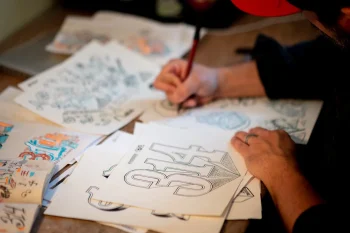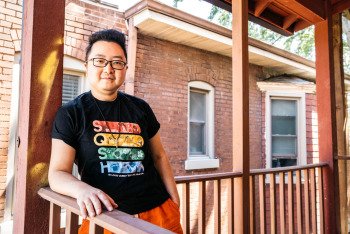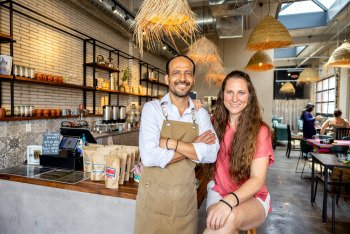Planting Seeds
Angi Taylor found meaningful work in St. Louis’s growing agriculture industry.
“I never thought I would love it so much.”
People often equate the search for the perfect job with a quest for the Holy Grail — something that’s elusive or mythical.
But not Angi Taylor. Her role as a lab clerk at NewLeaf Symbiotics has unleashed ideas and skills within her that had gone unappreciated in previous positions.
So for her, the job search is over.
“It’s always a challenge. I’m always learning something new,” Taylor says. “I didn’t realize that I could maintain a robot. I didn’t realize that I was able to mix up some ingredients that could be used to feed an organism that’s then going to feed the world. I’m out of my comfort zone, but I like it.”
Thousands of St. Louis residents are finding similar satisfaction as they take positions within the region’s growing agricultural sciences sector. As a region full of major industry players, startups of every type, higher-education programming, innovation incubators, research labs and thousands of farms, St. Louis has gained a reputation as one of the leading agriculture, plant science, bioscience and ag-tech centers in the nation and — increasingly — the world. A recent case study from Brookings Institution highlights the area’s commitment to further developing the industry and what it will mean for the local economy:
“The region’s leaders have continued to make the case for considerable investments in the cluster with a variety of other arguments–namely, it is a key source of innovation, offers highly paid jobs, is globally competitive, is distinct as an economic development focus, and promises to be a future growth opportunity due to global population growth.”
But for the industry to continue to grow, St. Louis must develop talent at every level. St. Louis Community College is doing that in an especially innovative way. The College’s Center for Plant and Life Sciences moved to the Bio-Research, Development and Growth Park (BRDG Park) on the campus of the Donald Danforth Plant Science Center in 2008 to collaborate with the industry’s emerging ecosystem of scientists and startups and train students in lab and equipment skills. Since then, students with STLCC’s life science lab assistant or biotechnology certificates have been able to land relevant, high-paying jobs with local companies almost immediately after completing coursework.
That’s the route Taylor took, though she first had a few stops along the way. With a bachelor’s degree in broadcasting and a master’s degree in communications/speech, Taylor was an administrative assistant in the college’s Center for Plant and Life Sciences with a plan to eventually move into nonprofit administration. But after seeing students train in the sciences and land gainful, interesting jobs at BRDG Park, she decided to take classes herself.
“Growing up in inner city St. Louis in the Walnut Park area, I was always led to believe that someone like me was not a scientist,” Taylor says. “I was fascinated. I would go into the lab and look at what they did and think, ‘Oh, wow this is amazing, but I can’t do this.’”
“But the lab manager at that time invited me to come in, put on a lab coat, get some gloves, some goggles and help her work with something,” Taylor continues. “And I realized that when you pour something into a beaker, it’s like cooking. It’s like working in a kitchen. I’m like, ‘Okay, this is not so daunting.’ So as a result of that exposure, I later took classes in life sciences at St. Louis Community College.”
Along the way, Taylor became an outreach specialist for the Center for Plant and Life Sciences and interned with NewLeaf Symbiotics before taking a permanent position as a lab clerk. NewLeaf, a rapidly growing startup at BRDG Park, uses naturally occurring organisms called M-trophs to strengthen plants increase their nutritional uptake and become stronger, ultimately producing more yield in a sustainable way. The company currently is working with M-trophs to help soybeans, corn, peanuts, tomatoes, lentils and more.
As a lab clerk, Taylor prepares media for the scientists who are working with M-trophs and ensures that the research lab equipment is disinfected and ready for use. She’s excited about what NewLeaf’s research could mean for society.
“I was impressed with how they were using science to help the world. They were using biotechnology to increase our food supply in a natural way,” Taylor says. “We have 8 billion people on the planet, but we don’t have additional farmable land, so we have to do more with the limited amount of land that we have.”
Taylor says that with collaborative ecosystems and training programs like the ones St. Louis Community College has, the opportunities for work in the various specialties within the agriculture industry are endless here in St. Louis — especially for those who may not have previously considered entering the sciences or who are looking for a career switch.
“I was actually seeing students graduate with a two-year certificate and gain employment that had great benefits — jobs that you could be proud of. And these were people from various backgrounds,” Taylor says. “I was not a traditional student. At that time, I was in my mid-40’s and taking classes all over again. But it wasn’t as impossible as I thought.”
As the industry continues to grow in St. Louis, even more trained specialists at all levels will be needed to staff both startups and established companies. It’s a challenge, but it’s one Taylor thinks the region is ready for.
“St. Louis right now is in a prime position for the new middle class. There are so many opportunities available but not enough students right now to fill those human resource needs that these companies have,” Taylor says. “We need to do what it takes. Learn something different. Yes it takes effort, but this is where the future is going. This amazing science is happening right here.”
Join the Story
- Learn about how St. Louis Community College’s Center for Plant and Life Sciences quickly prepares students for gainful agriculture jobs.
- See how NewLeaf Symbiotics is planning to feed the world.
- Read why the Brookings Institution says St. Louis is a leading region for growth in the agriculture industry.


